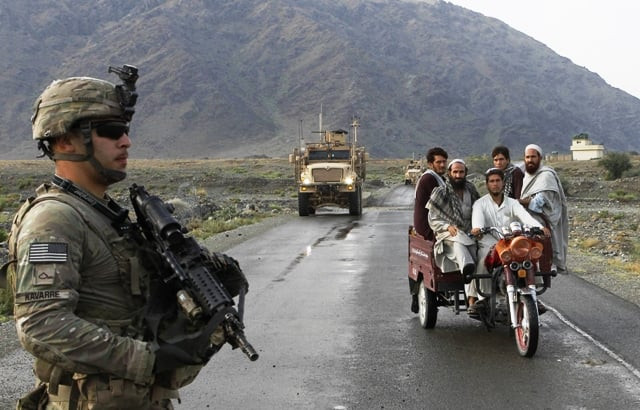Islamabad:
A group of 10 powerful and influential countries that included China, Russia, Iran, India and Pakistan on Tuesday opposed any attempt in the United States on Tuesday to be on the road in Afghanistan by taking control of the strategically important Bagram air base.
Without explicitly named the United States, a joint declaration published after consultations in Moscow’s format on Afghanistan reads
The declaration came in the context of President Donald Trump’s recent announcement in which he sought to regain control of the largest air installation in Afghanistan. The Taliban government has already clearly indicated that it would leave no foreign power to set foot on its soil.
The question was on the agenda at the Moscow meeting which was assisted by special representatives and senior officials of Afghanistan, India, Iran, Kazakhstan, China, Kirghizistan, Pakistan, Russia, Tajikistan and Uzbekistan.
For the first time, the Afghan delegation led by the Minister of Foreign Affairs, Amir Khan Mottaqi, participated in the deliberations as a member. A delegation of Belarus also attended the meeting as guests.
Pakistan was represented by Ambassador Muhammad Sadiq, who, during a closed -door meeting, raised the issue of terrorist hiding places in Afghanistan. In a statement published on X, Ambassador Sadiq said during Moscow’s format on Afghanistan format, Pakistan reaffirmed its unshakable commitment to a peaceful, stable and secure Afghanistan.
“I talked about the urgent need for collective regional efforts to counter terrorism and effectively dismantle all terrorist groups operating from Afghan soil,” he said.
“I also stressed the importance of strengthening regional cooperation in political and economic fields, as well as the fight against terrorism and anti-drug collaboration.
Meanwhile, participants in their joint declaration reaffirmed their unwavering support for the creation of Afghanistan as an independent, united and peaceful state. They underlined the need to develop economic and commercial exchanges, the cooperation in the investment of Afghanistan with the regional countries and the international community.
They expressed their interest in developing regional economic projects with Afghan participation and promoting regular progress in fields such as health care, poverty reduction, agriculture and disaster prevention, in order to help Afghanistan achieve an independent and sustainable development on an early date.
They supported the active integration of Afghanistan into the regional connectivity system.
The parties reiterated their commitment to pursuing humanitarian support towards the Afghan people and called on the international community to intensify the supply of emergency humanitarian aid to the Afghan people, while simultaneously reaffirming opposition to the attempts at politicization.
The parties have called to strengthen cooperation against terrorism at bilateral and multilateral levels.
They stressed that Afghanistan should be supported to undertake complete measures aimed at the elimination of terrorism and its eradication in a short period of time so that Afghan soil is not used as a threat to the security of neighboring countries and beyond.
The parties stressed that terrorism is a serious threat to the security of Afghanistan, the region and around the world. The parties highlighted the important role of regional executives.
The parties have urged countries mainly responsible for the current situation in Afghanistan to seriously respect the commitments on the economic recovery and the future development of Afghanistan.
On the sidelines of the session, the special representative of Pakistan for Afghanistan held a constructive and in -depth meeting with the Minister of Foreign Affairs Muttaqi. The 90 -minute commitment focused on the progress of bilateral cooperation in key areas, including economic cooperation, trade, public transport and regional security.
The two parties reaffirmed the importance of improved regional connectivity and have agreed to explore practical measures to facilitate trade and transit, in particular thanks to rationalized customs procedures and improved infrastructure links.
The emphasis was placed on the unlocking of the potential of regional commercial corridors to benefit from the wider region’s economic stability and development. They also exchanged opinions on the current security situation, in particular the presence of terrorist groups and its implications for cross -border trade and regional cooperation.
The two parties underlined the need for prolonged dialogue and collaboration to respond to shared security problems, ensure the safety of transport routes and fight against illicit activities.




